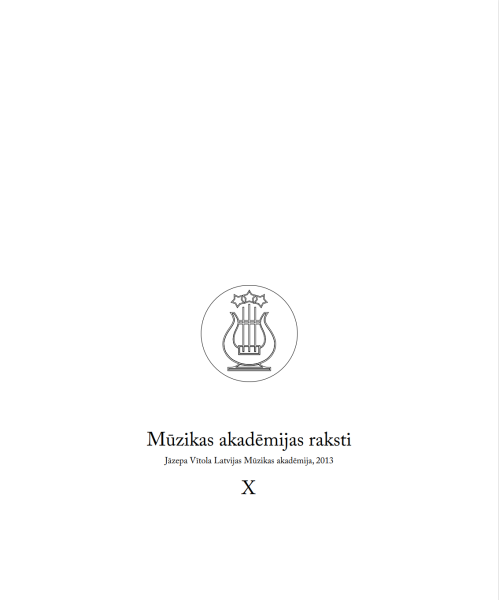INSIGHTS INTO SPECIFICATION OF RELIGIOUS MUSIC TERMINOLOGY
Keywords:
Religious music, music terminology, Sacred music, Spiritual music, Christian music, Ritual music, musicology, Gerhard JüngstAbstract
The central question of this article concerns the term Religious music and the use of the contextually close, often almost synonymous terms – Spiritual, Sacred, Christian, Church, Cult, Ritual, Ceremonial, Liturgical, Paraliturgical and similar terms in Latvian musical circles. In Latvian musicology, the usage of the above-mentioned notions is observed at the end of the 19th century. For example, during the First National Song Festival (1873), the first Sacred Music Concert was organized. Also, Jāzeps Vītols contemplated the terminology of religious music in his notes written while preparing for the theological department’s lectures An Introduction to Church Music at the University of Latvia in the 1920s and 30s. Arvīds Purvs was the next person who focused his attention on the concept of religious music and contextually similar terms (Purvs 1977: 78). Beginning in the 1990s, differentiations of the sacred music expressions by Roman Catholic priest and musician Gerhard Jüngst (born 1928) became known in Latvia.
Nowadays, we know the specifications of these terms both by Russian musicologists, as well by researchers in Europe and Englishspeaking countries outside Europe. The justification for each of these terms is determined by its etymology, as well as the concrete function of content embedded in the word, a task according to which a definite position can be formulated. Along with this, the specifics of using these concepts are made relevant, and traditional, decades-long usage has taken root in musical circles. The choice of an appropriate word makes it possible to guide every composition into the context of terminological idiosyncrasies, specifying the mission of the musical work and at the same time making easier its characterization.
Downloads
References
Ainsworth, Marta (2002). Be Still, and Know That I am God: Concert Halls Rediscover the Sacred. http://www.metanoia.org/martha/writing/bestill.htm (skatīts 2013. gada 1. novembrī)
Andersone, Indra, & Ilze Čerņevska [u. c.] (sast., 2008). Svešvārdu vārdnīca. 25 000 vārdu un terminu. Rīga: Avots
Baldunčiks, Juris (red., 2007). Svešvārdu vārdnīca. 3. izdevums. Rīga: Jumava
Bāliņa, Rita, & Inese Ēdelmane u. c. (2006). Latviešu valodas vārdnīca. Rīga: Avots
Grauzdiņa, Ilma (1993). Jāzeps Vītols un garīgā mūzika. Brīnišķais spēks. J. Vītola 130. dzimšanas dienai veltīts rakstu krājums. Rīga: [JV]LMA, 4.–25. lpp.
Hiršs, Ilmārs, & Sigita Hirša (2008). Reliģisko terminu vārdnīca. Rīga: Kristīgās vadības koledža
Jingsts, Gerhards (1991–1992). Lekcijas LU un JVLMA studentiem Rīgā un Gregorikas nedēļas nometnes dalībniekiem Āraišos. Pieraksti Jūlijas Jonānes privātarhīvā
Jonāne, Jūlija (2009). Latviešu sakrālās mūzikas žanri. Promocijas darbs (JVLMA). Rīga
Jonāne, Jūlija (2013). Konferences/Conferences. http://julijajonane.com/?page_id=27 (skatīts 2013. gada 17. jūlijā)
Latviešu folkloras krātuve [u. c.]. Krišjāņa Barona Dainu skapis. http://www.dainuskapis.lv/katalogs/30/7.1. (skatīts 2013. gada 14. jūlijā)
Latvijas Mūzikas informācijas centrs. Katalogi. http://www.lmic.lv/core.php?pageId=731 (skatīts 2013. gada 17. jūlijā)
Lindenberg[a], Vita (2002). Merkmale geistlicher Musik im zeitgenössischen Schaffen lettischer Komponisten. In: Loos, Helmut, & Klaus-Peter Koch (Hrsg., 2002). Musikgeschichte zwischen Ost- und Westeuropa: Kirchenmusik – geistliche Musik – religiöse Musik. Bericht der Konferenz Chemnitz 28.–30. Oktober 1999. Sinzig: Studio (Edition IME), S. 333–337
Loos, Helmut, & Klaus-Peter Koch (Hrsg., 2002). Musikgeschichte zwischen Ost- und Westeuropa: Kirchenmusik – geistliche Musik – religiöse Musik. Bericht der Konferenz Chemnitz 28.–30. Oktober 1999. Sinzig: Studio (Edition IME)
Melngailis, Emilis (1953). Latviešu mūzikas folkloras materiāli. 3. sējums (Vidiena). Rīga: Latvijas Valsts izdevniecība
Purvs, Arvīds (1977). Latviešu garīgā mūzika. Latviešu garīgās mūzikas ceļos. Toronto Sv. Andreja ev. lut. latviešu draudzes kora 25 gadu darbības atceres izdevums. [Toronto]: Toronto Sv. Andreja ev. lut. latviešu draudze, 78.–97. lpp.
Torgāns, Jānis (2002). Zur Entwicklung der lettischen geistlichen Musik. In: Loos, Helmut, & Klaus-Peter Koch (Hrsg., 2002).
Musikgeschichte zwischen Ost- und Westeuropa: Kirchenmusik – geistliche Musik – religiöse Musik. Bericht der Konferenz Chemnitz 28.–30. Oktober 1999. Sinzig: Studio (Edition IME), S. 563–571
Vītols, Jāzeps (1926–1936). Ievads baznīcas mūzikas vēsturē un teorijā. Studiju kursa konspekti (5 burtnīcas). Rokraksts (glabājas JVLMA, Jāzepa Vītola piemiņas istabā)
Gulânickaâ, Nataliâ (2002). Poètika muzykalʹnoj kompozicii. Teoretičeskie aspekty russkoj duhovnoj muzyki XX veka. Moskva: Âzyki slavânskoj kulʹtury
Katunân, Margarita (red., 2004). Novoe sakralʹnoe prostranstvo. Duhovnye tradicii i sovremennyj kulʹturnyj kontekst. Materialy naučnoj konferencii. Moskva: Naučno- izdatelʹskij centr Moskovskaâ konservatoriâ
Holopova, Valentina (2001). Formy muzykalʹnyh proizvedenij. 2-e izd. Sankt-Peterburg: Lanʹ
Downloads
Published
Issue
Section
License
Copyright (c) 2024 Mūzikas akadēmijas raksti

This work is licensed under a Creative Commons Attribution 4.0 International License.


